 Back to selection
Back to selection
Once Upon a Time in Cappadocia: The Scaping of Winter Sleep
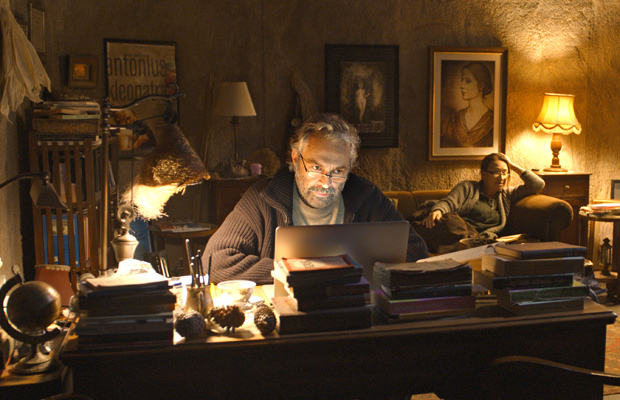 Winter Sleep
Winter Sleep According to the Institutional Theory of Art, a work becomes Art only after it has been validated by institutions and other taste maintainers (festivals, exhibitions, etc.). Given that Turkish director Nuri Bilge Ceylan’s latest film, Winter Sleep, earned him the Palme d’Or at Cannes in May, you could build a case that, officially anyway, his was the best of the 2014 harvest.
Now MoMA is hosting a complete retrospective October 29-November 5 of his relatively small body of work (seven features, one short). Nuri Bilge Ceylan (pronounced “noo-ree beel-gyeh jay-lan”) will be present to introduce Winter Sleep and Once Upon a Time in Anatolia, the latter having won Cannes’ Grand Jury Prize (the second best film of 2011?), as had Distant (ditto, 2002), a personal favorite and a kissin’ cousin of Winter Sleep. We owe a huge tip of the hat to the brave and magnanimous distributors with impeccable taste who have made it possible for these three titles to be released stateside: Adopt Films, which opens Winter Sleep December 19, Cinema Guild, and New Yorker Films, respectively. Tesekkur ederim!

Ceylan leaves little to chance. Form, mood, dialogue: Well ahead of production, he meticulously plans these, and how they bounce off one another and all the other pieces of the huge and complicated moviemaking pie. The m.o. serves him well. Let’s take, for example, the opening and closing shots of Winter Sleep vis-à-vis a single, telling line uttered smugly with a chuckle early on by wealthy, sixtyish property magnate and former theater actor Aydin (Haluk Bilginer) to close pal Suavi (Tamer Levent): “My kingdom may be small, but at least I’m the king.”
A gentleman farmer and widower, Suavi is visiting him at the chic boutique Hotel Othello, which Aydin owns and in which he and his retinue live. By the time he articulates this bit of ironic hubris, he has already begun to reveal himself. Although not without charm, Aydin proves to be pompous, condescending, uncharitable, unsympathetic, misanthropic, and so uncaring that he barely listens to anything not about him. (In one scene that makes you feel embarrassed for the two characters sitting beside him, he reads approvingly a letter prefaced by several paragraphs of shameless fawning from a young woman seeking donations for a needlecraft workshop.)
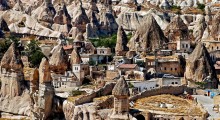 The very first shot is a zoom across the tall, wind-blown, grassy steppes and thrusting honeycombed rock formations of Cappadocia, a lunar-like region in Anatolia, finally zeroing in on the hotel itself, which has been carved out of the ubiquitous soft stone. At the start of the film, Aydin behaves as if he were a monarch, and is treated as such by some in his domain. The initial establishing shot not only pinpoints the location of events to come, it also marks the man’s territory as if it were a dog’s, granting a stamp of approval (or at least acceptance) to a hierarchy in which he stands indisputedly at the apex.
The very first shot is a zoom across the tall, wind-blown, grassy steppes and thrusting honeycombed rock formations of Cappadocia, a lunar-like region in Anatolia, finally zeroing in on the hotel itself, which has been carved out of the ubiquitous soft stone. At the start of the film, Aydin behaves as if he were a monarch, and is treated as such by some in his domain. The initial establishing shot not only pinpoints the location of events to come, it also marks the man’s territory as if it were a dog’s, granting a stamp of approval (or at least acceptance) to a hierarchy in which he stands indisputedly at the apex.
The subjects in this kingdom? His beautiful, intelligent, and much-younger wife, Nihal (Melisa Sozen); his recently divorced, viper-tongued sister, Necla (Demet Akbag); his factotum, Hidayet (Ayberk Pekcan); an almost invisible maid; and, indirectly, assorted tenants around the nearby village who pay him rent, just as they did to his presumably kinder father. The odd but harsh environment both embraces and dismisses the members of this fractured family, a clear nod to Chekhov. (Ceylan dedicated 2000’s Clouds of May to the Russian dramatist, and told an audience at the BFI Southbank in 2009 that he has in fact influenced every one of his films.)
The first 30 minutes takes place almost entirely outdoors; most of the remainder of the film is insistently interior, in every possible meaning of the word. At the end the zoom reverses, going backward from within the structure across the same toadstool formations as before. The image that remains with us following this cinematic equivalent of an unhurried novel is the hotel in extreme long shot, barely more than a miniature laid down in this broad eerie landscape. This final shot announces a power vacuum. The edifice acts as surrogate for its patron. It is one among many, no better, no worse. (Although both films are shot in widescreen, Once Upon a Time in Anatolia’s vast expanses lack Winter Sleep’s odd sculptures. The residue of volcanic eruptions millions of years ago, these are proto-props, proto-sets, providing a heavily pre-designed mise-en-scene. In the former film, Ceylan leans on otherworldly lighting effects to draw attention to a more ordinary landscape of rolling hills.)
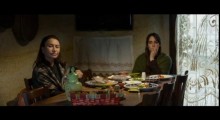
Ceylan said in an interview that he and his wife, Ebru, started writing the script with the married couple in mind, then added the sister, and — once they realized they required a link to the town — included a poor extended tenant family. The last provided them with other opportunities: to elaborate upon Aydin’s greed and disdain for the underprivileged; to drive a wedge between him and the socially conscious Nihal, who channels the luxury of free time and a rich husband into fundraising to improve schools for the needy; to counterpoint her nobly ethereal vision with earthy renter Ismail (Nejat Isler), an unemployed ex-con and drunkard, inflexible but, in Ceylan’s words, a utopian; to add as another type of moral compass his brother, Hamdi (Serhat Kilic), the local imam but also a buffoon and a weak-kneed kiss-ass; to develop a major plot point when Ismail’s young son, Ilyas (Emirhan Doruktutan) — angry that Aydin’s unyielding debt collectors have not only taken away their television but also humiliated the family — smashes a window on the landlord’s truck with a rock; and to create a metaphoric space equating Ismail and Ilyas’s unharnessed wild energy with that of the Anatolian horses that roam freely and so gracefully they almost demand screen time. (Cappadocia is Turkish for “land of the wild horses.”)
The horrific capture and secret liberation of a sleek white steed has a potent if obvious symbolic meaning for a few characters in the family, each hemmed in in their own way. Aydin, for example, has unwittingly been in a prison of his own making ever since he gave up his life in Istanbul for the relatively easy life of a privileged hotelier in an economically depressed zone. He has isolated himself and become a creature of habit, in much the same way as Mahmut (Muzaffer Ozdemir), Distant’s lonely, middle-aged photographer, who takes in a vulgar bumpkin of a relative just to hear someone else’s voice in his Istanbul apartment. A guileless free spirit staying in the hotel inadvertently rubs into Aydin’s face his entrapment into domesticity and codependency.
When Hamdi brings the resisting Ilyas to the hotel to apologize by kissing the hand of the ridiculing Aydin, the pent-up boy stands up, but not to fight: He faints. This scene is echoed later when the older man is shoved into a corner with a baseless accusation by friends that he cannot, as is his habit, squirm out of. He responds with his gut rather than his voice box: He vomits. (If you can’t verbalize, somatise.) The ugly scene marks the beginning of Aydin’s destruction. In quick succession, he encounters a series of dead animals before returning, broken, to the Othello. After three film hours of bloviating, Aydin suffers a near collapse and much-needed humbling that end in a voiced-over interior monologue in which he — uncharacteristically, if ambiguously — admits defeat in a marital battle to the quietly observing Nihal, whose sound inside the hotel he can not bear to relinquish. He has had his day of reckoning. Ceylan, however, refuses to leave him in that condition. We last see him back at his computer typing the title of his long-planned but constantly procrastinated history of Turkish theater. I am paraphrasing, but Ceylan has said in interviews that Aydin had to touch rock bottom before reinventing himself and becoming resurrected.
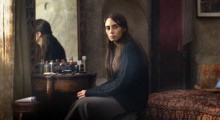
Ceylan anchors the film with two long, dialogue-heavy scenes in which Aydin argues with the women in his life. He takes a no-nonsense, shot-reverse shot approach in the style of Bergman. The hatred is palpable; these are competitions in insidiousness. Vile Necla wants nothing more than to undermine her cocky brother, his moralistic weekly column in the local newspaper (“Voices of the Steppe”) and his distinguished stage career. She baits him with faux-philosophical debates about the nature of evil, arguing that you can prevent it by allowing the potential evildoer to do whatever in the first place — mainly because she is bored, bored, bored and should have stayed in Istanbul after her marriage collapsed.
The jousting takes place in Aydin’s study, which is located in a separate building. The posters from his theatrical past do not mask the fact that the architecture envelopes them in a lair of seething hatred. Thankfully, the siblings are unable to look into each other’s eyes. He faces his computer; she is behind him, lounging on a sofa (see photo at top). An example of Ceylan’s editing talent (he co-edited with Bora Goksingol, although he edited most of the other films himself) is the cut on sound from a shot of the two ready to scratch each other’s eyes out to a shot the next morning in the breakfast room in which Necla is seated a little too far away from Nihal, whom she despises, and where they reprise the faux-academic disagreement on the essence of iniquity.
In their ugly fight in her sleeping quarters, Aydin and Nihal speak of more personal matters. He had crassly barged in on a meeting of members of her most recent foray into charity, and now demands a say in all of the decision-making. Although they sit far apart, Ceylan shoots each in tight close-up. They soon get to the real point: the state of their marriage. We find out they have had this conversation many times before, and one of Ceylan’s more brilliant decisions is to follow the different paths that the aftershocks take them. Scenes From a Marriage, circa 2014, Turkey, or, with a location change, nearly anywhere in the developed or developing world.
So much verbiage comes as a surprise from a man who formerly eschewed its use, or at least minimized it. He let images and lighting do the talking. In interviews this year, he has said that he decided to risk opting for literary speech — after all, TV commercials have co-opted normal ways of speaking — something that he thought functions well in theater but could not be sure of in cinema. Experiment successful, all the elements rippling as hoped for into the other pieces of the puzzle. It did, however, require another iffy alteration: He had to dispense with the amateur performers he had always used and engage professionals to speak in this slightly stilted manner. Haluk Bilginer, for example, is so exceptional as Aydin, and so easily shifts from persona to persona, that he takes you along with him into the unlikable character. And Nejat Isler as the fierce Ismail is remarkable in a scene involving loads of cash and a fireplace, borrowed from Dostoyevsky, which is so frightening and devastating that it nearly divides the film in two.
 Strangely enough, Cappadocia was not Ceylan’s first choice for a location. He artfully tweaks convention with this Chekhovian family and setting. The hotel itself appears constructed to execute the screenplay. The vaulted ceilings, the curves between walls and floor, the convoluted corridors add to the air of an intimate but claustrophobic maze, and a paranoid one at that. Despite the brightly painted walls, the feeling is strongest in the bedrooms and Aydin’s study, both sites of disagreement. (The stuffed chairs and couches are not a good fit, aesthetically anyway.) These are, of course, cages. Ceylan illuminates one spot with a single colored light, uses mirrors to confound us — and the characters. Public areas such as the lobby, the breakfast room, and the downstairs meeting area are sparsely furnished, more open.
Strangely enough, Cappadocia was not Ceylan’s first choice for a location. He artfully tweaks convention with this Chekhovian family and setting. The hotel itself appears constructed to execute the screenplay. The vaulted ceilings, the curves between walls and floor, the convoluted corridors add to the air of an intimate but claustrophobic maze, and a paranoid one at that. Despite the brightly painted walls, the feeling is strongest in the bedrooms and Aydin’s study, both sites of disagreement. (The stuffed chairs and couches are not a good fit, aesthetically anyway.) These are, of course, cages. Ceylan illuminates one spot with a single colored light, uses mirrors to confound us — and the characters. Public areas such as the lobby, the breakfast room, and the downstairs meeting area are sparsely furnished, more open.
Interior design sends out far different signals inside Suavi’s ranch home. After Aydin sneaks off there and bumbling schoolteacher Levent (Nadir Saribacak) joins the old friends, a drinking spree ensues. The three are seated in a comfortable, airy living room of evenly lit browns. The building is more perpendicular than the curvy Othello. The purpose of the large fireplace is as much to facilitate communion as to offer warmth, unlike those in the confining rooms of the hotel, so paradoxical in spaces governed by spite and power plays.
Suavi himself, the kind of person who is always around to help, is probably the least aggressive, most easygoing character in the film. Aydin finds fault in almost everyone, mainly to feel better about himself. No one, however, sees negativity in Suavi. If light self-deprecation is a flaw, then, yes, he is guilty. Without an oversaturated Hollywood gloss, his living quarters nestle him and his guests in much the same way that, ultimately, the outdoors nurse the entire community.
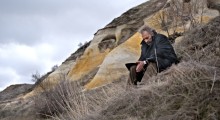
Yes, all of the currents in Winter Sleep operate harmoniously. Cinematography: kudos to master DP Gokhan Tiryaki, whose editors assemble his shots for a perfect dramatic ride. Sets, lighting, performances: outstanding. Music: minimal but transcendent, recurring bars of Schubert’s Sonata No. 20 just as in Bresson’s Au hasard Balthazar. Humor: yes, as always, a few light laughs for a human touch.
In earlier incarnations, the filmmaker was a student of chemical and electrical engineering, then earned a living as a professional photographer. Details like this may help us comprehend his genius, and why Ceylan leaves little to chance.
